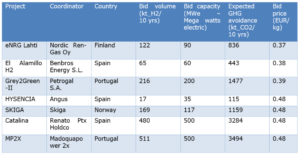The European Commission has recently awarded almost €720 million to seven renewable hydrogen projects in Europe through a highly competitive bidding process of the European Hydrogen Bank. The funds for this auction come from the revenues of the EU Emissions Trading System. The winning bidders, selected from a pool of 132 bids, will produce renewable hydrogen in Europe and receive a subsidy to bridge the price difference between their production costs and the current market price for hydrogen, which non-renewable producers drive.
“The European Hydrogen Bank will provide valuable support to the decarbonisation of European industry. The high number of bids and the investments awarded today are a clear signal of confidence in the nascent renewable hydrogen market. There is a strong project pipeline in Europe and a competitive industry. These are encouraging signs for the future of this important net-zero technology,” stressed Maroš Šefčovič, Executive Vice-President for European Green Deal, Interinstitutional Relations and Foresight.
The Innovation Fund, the EU’s largest funding programme for deploying innovative net-zero technologies, with an estimated budget of €40 billion between 2020 and 2030 from the revenues of auctioning allowances under the EU Emissions Trading System, is a testament to the European Commission’s commitment to promoting renewable energy. The European Hydrogen Bank, announced by President Ursula von der Leyen in her State of the European Union address in 2022, is another initiative by the Commission to promote the EU’s domestic production and imports of renewable hydrogen.
The first auction of the European Hydrogen Bank, a significant step towards a greener future, received 132 bids from 17 European countries, with over 15 times the available €800 million budget requested. Out of 119 eligible and admissible proposals, they were ranked according to their bid price and evaluated by the European Climate, Infrastructure and Environment Executive Agency (CINEA). The bids submitted ranged from €0.37 to €4.5 per kilogram of renewable hydrogen produced. The aim of the European Hydrogen Bank is to unlock private investment in the EU and third countries, address investment challenges, close the funding gap, and connect future renewable hydrogen supply to consumers.The European Hydrogen Bank is therefore contributing to the scale-up of cleaner fuels which will significantly contribute to the decarbonisation of European industry. The renewable hydrogen they produce will be used in sectors such as steel, chemicals, maritime transport and fertilisers. The 7 selected projects were the winners of an oversubscribed auction which attracted 132 bids in total. Together, the winning bidders plan to produce 1.58 million tonnes of renewable hydrogen over ten years, avoiding more than 10 million tonnes of CO2 emissions. The selected projects are located in 4 European countries. They submitted bids between €0.37 and €0.48 per kilogram of renewable hydrogen produced, and also met the other qualification requirements. The subsidy the 7 projects will receive ranges from €8 million to €245 million.
“The results of our first EU-wide auction for renewable hydrogen production are very encouraging. These innovative auctions, funded by the revenues from emissions trading, are a game-changer when it comes to producing renewable hydrogen in Europe. The high level of interest shows the strong potential for this market, and the need for resources beyond the EU budget. I encourage other Member States to follow Germany’s lead, and make use of the “Auctions-as-a-service” to support renewable hydrogen production at national level using our European auction platform,” said Wopke Hoekstra, Commissioner for Climate Action.
These are the selected projects:

Germany has made €350 million in national funding available for the highest ranked projects in Germany that did not qualify for EU-level support but meet the eligibility criteria through the new ‘Auctions-as-a-service’ mechanism. This mechanism, a part of the EU-level auction platform, allows all Member States to benefit from the platform and award national funding to additional projects. The winning projects will be selected and communicated by the German authorities. The European Climate, Infrastructure and Environment Executive Agency (CINEA) will prepare individual grant agreements with the seven selected projects, and these agreements are expected to be signed by November 2024 at the latest. The selected projects must begin producing renewable hydrogen within five years of signing the grant agreement and will receive the awarded fixed premium subsidy for up to ten years for certified and verified renewable hydrogen production.
The Commission plans to launch a second European Hydrogen Bank auction by the end of this year, taking into account the lessons learned from this pilot auction and consulting further with stakeholders before launching the next auction.
“The EU is becoming a hub for clean technologies. The results of the first auction of the European Hydrogen Bank prove the high interest from European industry to produce and use hydrogen on our continent. The selected projects will help us to deliver the EU’s 2030 energy and climate targets, while creating new opportunities for green jobs and skills. The second hydrogen bank auction later this year is another exciting opportunity for European industry and I hope to see similar interest then,” added Kadri Simson, Commissioner for Energy.

